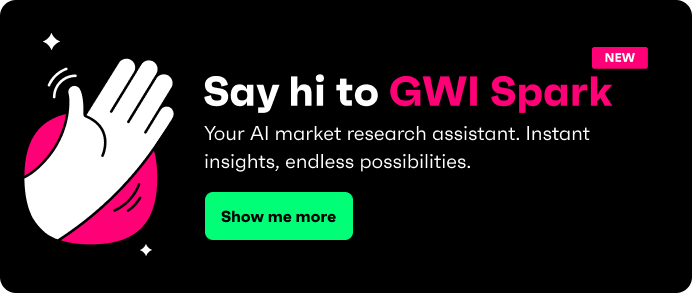
Great brands truly dig into why people buy their products. And to get there? Attitudinal data uncovers the beliefs and values behind those choices.
When you get that, you can build campaigns that don’t just talk at people but actually connect with them in a way that lands.
That’s how you build real loyalty.
What is attitudinal data?
Attitudinal data goes deeper than demographics, capturing how consumers feel and what they believe. It’s not just about who your customers are or what they do, it’s about how they feel, what they care about, and what drives their decisions. It digs into personal values and cultural vibes, helping you understand the real reasons behind every purchase or action.
Attitudinal data vs behavioral research: Understanding the difference
Imagine watching a sports game: behavioral data is the scoreboard, showing you what happened. Attitudinal data? That’s the coach explaining why the team played the way they did. You need both to get the full picture.
What is behavioral research?
Behavioral research tracks actual consumer actions, such as website visits, product purchases, and online engagement. It’s the data you can see and count, showing you what’s actually happening.
Why you need both for comprehensive insights
Using only behavioral data is like watching a movie without sound - you see what’s happening, but miss the story behind it.
Mix in attitudinal data, and suddenly you get the full picture: not just what people do, but what makes them tick. That’s where real connection starts.
Attitudinal research methods
Getting under the hood of consumer attitudes takes more than counting clicks. Here’s how brands do it:
- Surveys ask direct questions to get a broad sense of what people think.
- Focus groups and interviews dig deeper, uncovering feelings and motivations.
- Psychographic profiling sorts people by what they value and how they live.
- And implicit testing? That’s about uncovering the stuff people might not even realize about themselves.
Behavioral research methods
Some of the most common behavioral research methods typically include:
- Observational analytics: Tracking user interactions across websites or apps.
- Purchase tracking: Analyzing buying habits and patterns.
- Website heatmaps: Visualizing which areas on a webpage users engage with most.
- A/B testing: Experimenting with content variations to understand what performs best.
Leveraging attitudinal data: How GWI enhances consumer understanding
GWI makes it easy to tap into attitudinal insights, at scale and on demand.
With simple APIs, you can pull this data right into your dashboards or tools, so your team gets the “why” behind customer behavior without spending hours hunting for answers. It’s about making insights effortless and actionable.
Attitudinal data sets
GWI’s data sets cover everything from global attitudes about brands and tech to how people see themselves. For the US, they dig into trust in institutions, political leanings, and what really drives people’s values, helping you talk to audiences in ways that actually feel genuine.
Psychographic personas: Turning attitudes into action
Using GWI’s consumer insights, you can create detailed psychographic personas that bundle people together based on what they believe and care about.
Instead of guessing, brands can use these ready-made groups to target smarter and make campaigns hit harder.
Instant insights through GWI Spark
With GWI Spark, you just ask, no complicated queries needed, and get attitudinal insights instantly.
It’s like having a real-time pulse on your customers’ beliefs and feelings, helping your team make smart calls on the go.
Advanced audience segmentation with attitudinal insights
Whether you want to slice your audience by attitudes alone or mix them with demographics and behavior, GWI helps you zoom in on the right people, so your message lands where it counts.
Tracking attitudinal trends over time
Attitudes change, and GWI keeps you ahead by tracking shifts over months or years. That way, you can spot new trends early and tweak your strategy before the market moves out from under you.
Practical use cases: How brands benefit from attitudinal data
GWI’s attitudinal insights consistently deliver tangible business impact, as these real-world cases clearly show:
Using deep audience insights to power a high-impact brand launch
Bright/Shift used GWI to uncover what truly mattered to their client’s target audience - balancing eco values with price sensitivity and social proof. These insights shaped the client’s entire strategy, from positioning to creator content, helping them generate £41k in revenue within the first month.
Sealing the deal with hyper-targeted consumer insights
Eurosport used GWI’s custom research to rapidly gather insights into a niche UK audience ahead of a sales pitch. These hyper-targeted insights enabled their sales team to create compelling pitch materials tailored to the client's sector, helping them move quickly and win business.
Unlocking international content opportunities
Sony’s Hong Kong team used GWI’s tailored research to understand US audiences’ appetite for Korean drama. The insights helped them build detailed viewer profiles, validate content strategies, and make informed recommendations to licensing partners - debunking myths around dubbing and proving demand for subtitled originals.
Final takeaway: Unlock deeper connections with attitudinal insights
If you want to truly connect with your customers, attitudinal data is a must-have.
Tools like GWI make it simple to gather and use these insights, helping you to create authentic messages that actually resonate. In a world that’s always changing, understanding what your customers believe and value is the secret to standing out. What are you waiting for?
Frequently asked questions about attitudinal data
What is attitudinal data?
Attitudinal data captures consumer beliefs, values, feelings, and motivations, helping brands understand the emotional and psychological reasons behind consumer decisions.
How is attitudinal data collected?
Common methods include surveys, focus groups, psychographic profiling, and implicit association testing, all aiming to uncover deeper consumer motivations.
Why should brands care about attitudinal data?
Understanding consumer attitudes enables brands to build authentic connections, craft resonant messaging, and develop strategies aligned with consumer values, leading to better engagement and loyalty.





.webp?width=495&height=317&name=pink_thumb_graphs%20(1).webp)
.webp?width=495&height=317&name=pink_thumb_letter%20(2).webp)